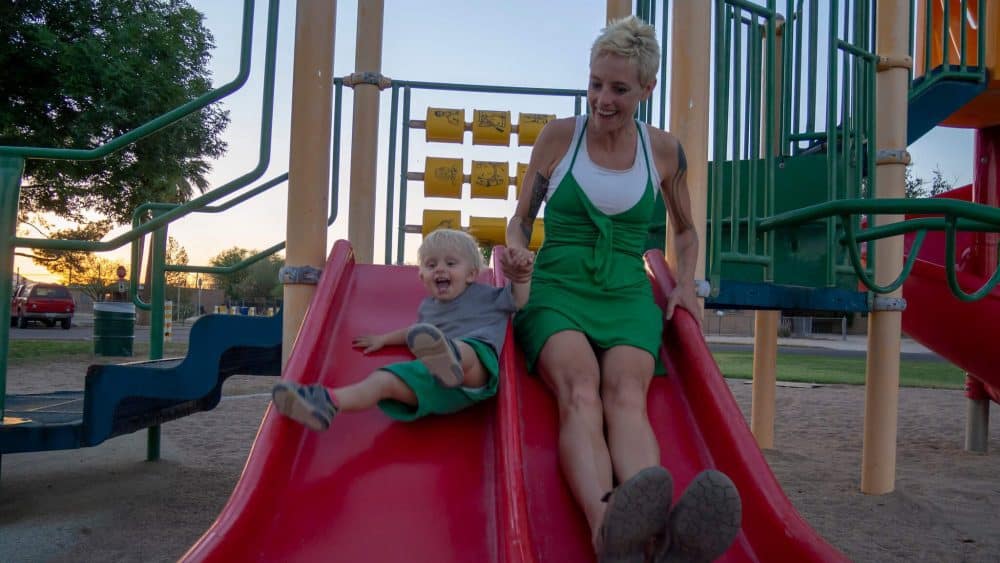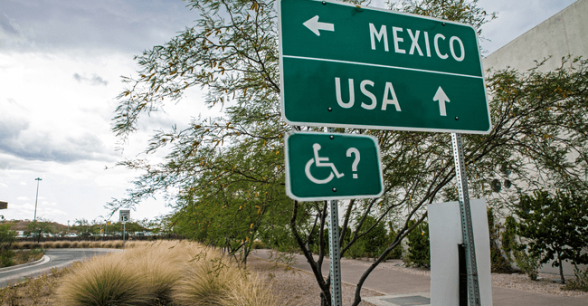My Son’s Disability Taught Me to Be Proud of My Own Disability
When I was born, the doctors told my parents I was blind. That was the first line of my college application essay and the narrative starting point of my life. My parents took me to the doctor because my eyes were moving and jiggling, much more than most babies eyes do. They diagnosed me with nystagmus, and told my parents I would likely never read or lead a “normal” life.
My mother took that as a challenge and, as the doctors prescribed in that era, spent countless hours doing vision therapy with me – trying to get me to look at and track brightly colored objects. My first word was “eyes.” I can’t remember a time I didn’t know that I couldn’t see normally – or a time when I didn’t pretend to be able to see things I couldn’t, both to please those around me, and to pass as fully-sighted.
My mother, of course, wanted me to overcome my disability and did everything in her power to achieve that goal. Rather than having me placed in special ed – “you weren’t special ed” – she homeschooled me until middle school. To her credit, I excelled academically. I graduated from Stanford. My “normal-ness” was a testament to her willpower.
But this emphasis on “overcoming” had its costs. I still fight back tears when I have to tell someone I can’t see something – like the cashier at a fast food restaurant who I ask to read the wall menu for me.
Immediately after college, I moved to New York City. The subway made it easy to not tell people I couldn’t drive, or that there was anything different with my vision. Keeping it a secret backfired when people who eventually got to know me well realized that I wasn’t actually stuck up, I just couldn’t recognize them when they’d wave at me across the street. But when in the course of a more casual friendship or work relationship was I supposed to mention I can’t see? As I worked hard to build my video production company, I never wanted clients to think of me as less capable.
Everyone says what you value changes when you have kids. But when my son was born, I was convinced that wouldn’t apply to me.
“He’s so perfect,” my mother declared, looking into his steady, blue eyes.
Three months later, she came back to visit. As soon as I handed her my son she noticed: “His eyes are moving. Babies eyes shouldn’t move this much.” So the next day when the city had nearly ground to a standstill in twelve inches of thick wet snow, we took him to my eye doctor.
I cried for a day. Then as my feelings began to sort themselves and I realized I was not crying because he was disabled. I was crying because of the emotional pain and shame I associated with my own disability.
I believe the beautiful spectrum of our human ability enriches our culture and society. I believe that “disability” is a construction of faulty design, design that isn’t creative enough to fit the needs of those of us labeled as disabled. A built environment too driven by the free market to be inclusive.
This is the frame for disability that I want my son to internalize. I don’t want to fix him. I don’t want him to be “normal.” I want him to able to declare with pride that he can’t see something when he can’t see it. His difference will help shape and define him. It is his gift to the world, just as it has been for me.
Having him enter my life is what has allowed me to begin my own process of healing and growth, a process that has lead me to seek out the disability justice movement. I am both thrilled and so honored to be able to help build this movement as the new Program Director for the Rooted in Rights team!
About Rooted In Rights
Rooted in Rights exists to amplify the perspectives of the disability community. Blog posts and storyteller videos that we publish and content we re-share on social media do not necessarily reflect the opinions or values of Rooted in Rights nor indicate an endorsement of a program or service by Rooted in Rights. We respect and aim to reflect the diversity of opinions and experiences of the disability community. Rooted in Rights seeks to highlight discussions, not direct them. Learn more about Rooted In Rights




Wow, Anna, I did not know that. You accompanied us during our visit to the USA. You took such great pictures of us. I’m always excited when I see your pictures. I like the pictures very well. I am very happy that I met you. Great how you do it all. You have a great little son. I wish you every success in your new job. Greetings from Germany. Stephan
Congratulations Anna and thank you for your blog post. I have a 13 year old son with Nystagmus and I struggle with my own feelings and helping him navigate the world. You are uniquely qualified to help your son navigate his experience of the world. We live right outside of New York City and I wish we could connect with other families. Thank you!
What a great story. This really stood out for me when she said. “This is the frame for disability that I want my son to internalize. I don’t want to fix him. I don’t want him to be “normal.” I want him to able to declare with pride that he can’t see something when he can’t see it. His difference will help shape and define him. It is his gift to the world, just as it has been for me.” We should all take a lesson from this. We all need to live our lives for who we are, not what we are.